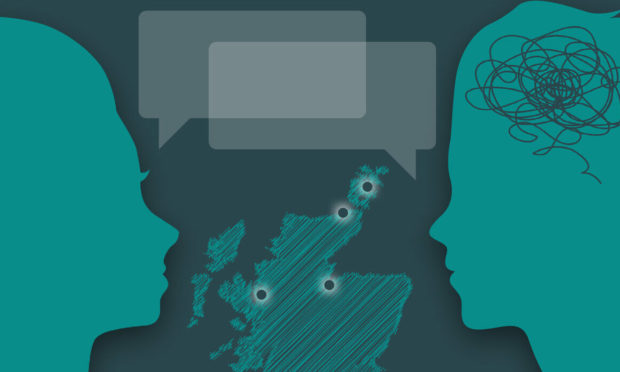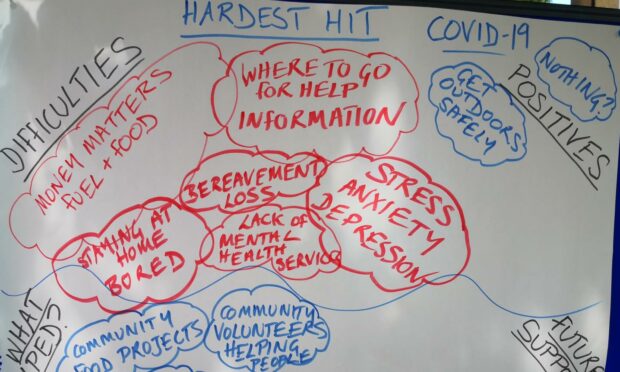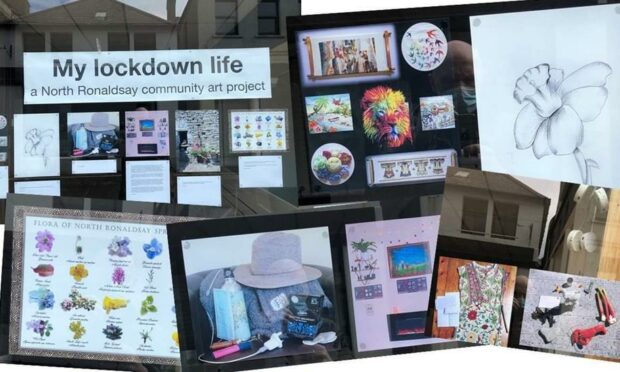People suffering mental health issues during the pandemic faced a “perfect storm” in some areas of the north, lacking face-to-face support and being unable to access online services.
A new report highlights how Covid heightened mental health issues, particularly among young people.
It also worsened existing inequalities including unemployment and food and digital poverty.
The report by the University of the Highlands and Islands focuses on deprived, urban areas as well as remote, rural communities across the region.
Who carried out the research?
It calls for long-term funding for community-based groups to help the hardest-hit during the Covid recovery.
It also highlights the need for fast and affordable broadband connectivity as well as essential online training as part of a recovery strategy.
Research was led by the Centre for Remote and Sustainable Communities at Inverness College UHI and the Centre for Mountain Studies at Perth College UHI.
It also involved the Centre for Recreation and Tourism Research, Institute for Northern Studies and the Environmental Research Institute.
More than 260 people were interviewed in four areas – Merkinch and South Kessock in Inverness, Kyle and Lochalsh, Caithness and Orkney.
“There was a striking concern about, and experiences relating to, mental health across all communities and a huge number of accounts of how the pandemic has exacerbated existing mental health problems”, it says.
“This was particularly evident among younger generations, affecting people trying to balance livelihoods with childcare and those experiencing isolation.
“There was also much concern about both the immediate and longer-term impacts on children and teenagers.”
Mental health issues related to lack of face-to-face contact with others in the community and with services.
Stress, anxiety and fear
Schoolchildren were aware about their mental health and teachers had concerns about pupils, including suicide attempts and anxieties about returning to school.
Adults consistently talked about stress, anxiety and fear of the pandemic, with feelings of isolation, boredom and depression.
Dr Vicky Johnson, director of the Centre for Remote and Sustainable Communities, said the lack of face-to face-contact and services was a “huge concern”.
She said: “If you couple that with digital poverty you have a perfect storm. Basically people who need them most are not going to access services.
“They are not able to talk to someone face-to-face, or they have a lack of digital skills, devices or bandwidth and can’t start a conversation.”
The Merkinch and South Kessock report reveals many people want local face-to-face services, including for mental and physical health and to support addiction recovery.
The report says: “Anything that has had to be done online has been incredibly hard as the community has an analogue, more traditional, approach to accessing services and purchasing food, clothes and necessities.
“They only knew about services they had already accessed and didn’t have the information, capacity or basic digital skills to engage effectively in the digital world.”
Anne Sutherland, manager of the Merkinch Partnership community group, said a future plan will focus initially on food and fuel poverty, digital exclusion and accessing services.
People feel isolated
She said: “A big issue that came out of interviews was that people with poor digital skills or did not have digital devices were completely isolated.
“All the information about what support they could get and helplines was online.
“We knew digital exclusion was an issue. But during the pandemic suddenly there was no face-to-face for a lot of the people who were hardest hit.”
She said the partnership was able to help those in need: “But the inequalities with digital exclusion has definitely become wider.
“And now with the NHS saying they are not going back to full face-to-face how do we address that?”
The report was funded by the Research Uplift Fund of the Scottish Funding Council.
It recommends longer-term funding for community groups to ensure support for the hardest to reach people and those who need help the most.
Priorities for future action across the region also include support for groups helping young people’s education, employment and social activities and those living alone.
Dr Johnson said: “We need to keep listening to people in communities and understand who has been hardest hit and what help they still need.
“The effects of the pandemic have not disappeared even if the support to people is disappearing.”
The report says there is clear evidence the pandemic impacted most on the under-30s in Kyle and Lochalsh.
Need to lessen dependence on tourism
Younger people working in lower paid jobs, often in tourism, felt less supported than older people.
There was also discussion of negative issues faced by children and teenagers in the areas due to isolation.
Although many felt they were relatively isolated from the virus, future priorities include improved support for mental health, better social spaces and activities for a more connected community.
Many people urged options for economic diversification to lessen dependence on tourism industry be explored.
The tourism industry was also a key area of concern in Orkney.
Responses from tourism operators reflected the feeling that they had been abandoned as they struggled through the pandemic.
In Caithness, adults and children expressed concerns about disrupted education and anxiety about not being at school or having social interaction.
However, the report also highlights evidence of increased community cohesion. Neighbours helped each other and there was enthusiasm to take on voluntary roles.
Related reading:




